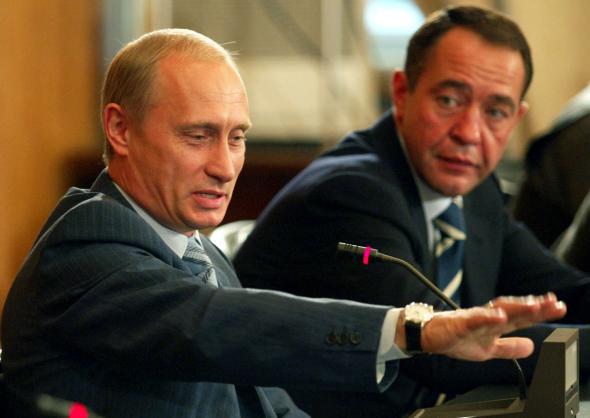Mikhail Lesin, who served for years as a top adviser to Vladimir Putin, died under mysterious circumstances while staying in a Washington hotel in November 2015. A little less than a year later, federal prosecutors declared that the 57-year-old’s death had been an accident—the unfortunate result of a drunken bender that ended with Lesin falling down and sustaining fatal injuries to his head, neck, and torso.
But according to BuzzFeed News, that’s not what really happened. Citing several FBI agents, who spoke on the condition of anonymity, the website reported Friday that Lesin was beaten to death, and that his murder occurred the night before a scheduled meeting at the Department of Justice. According to one BuzzFeed source, the weapon used to kill Lesin was a baseball bat.
One of Lesin’s core achievements as a government official in Russia was launching Russia Today, or RT, the state-owned, English-language cable channel that broadcasts pro-Russia news in the U.S. According to BuzzFeed, the Justice Department was interested in speaking with Lesin in order to learn more about RT—“basically, how the propaganda machine works”—and had paid for the hotel room where Lesin died.
“Lesin was beaten to death,” one FBI agent told BuzzFeed. “I would implore you to say as much. There seems to be an effort here to cover up that fact for reasons I can’t get into.”
He went on: “What I can tell you is that there isn’t a single person inside the bureau who believes this guy got drunk, fell down, and died. Everyone thinks he was whacked and that Putin or the Kremlin were behind it.”
The particulars of the case—who exactly wanted Lesin dead and why—are not clear, and BuzzFeed emphasizes that none of its sources were personally involved in the investigation. But apparently Lesin had fallen out of favor with Putin’s inner circle in the years before his death, abruptly resigning from his post atop Kremlin-controlled Gazprom Media. At the same time, he was going on a spending spree around the world that apparently got the attention of a U.S. senator, who wrote a letter to then–Attorney General Eric Holder asking the Justice Department to look into Lesin’s finances. Lesin “was feeling good until that letter came out,” an intelligence officer told BuzzFeed, but afterward, “Putin decided to cut him loose as a potential liability. Once Putin ditched him, once he lost his protection, Lesin’s partners and competitors started going after him.”
It’s hard to know what to make of this story right now, in large part because the FBI has not made any of its investigative materials available to the public. But the fundamental question provoked by BuzzFeed’s reporting is why the official story of Lesin’s death, as recounted last year by then-U.S. Attorney for the District of Columbia Channing Phillips, differs so dramatically from what so many at the FBI apparently believe.
